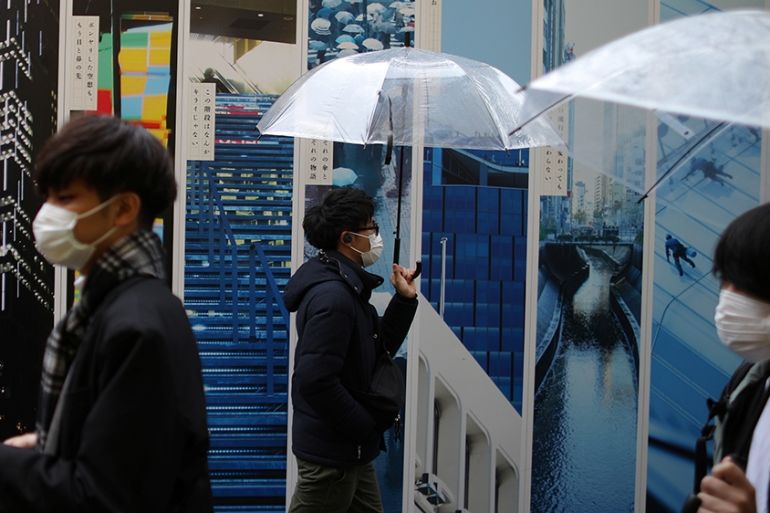Asian governments announce measures to help virus-hit economies
In Japan, Australia and Indonesia, policymakers offer cash injections and other measures for investors and businesses.

Asian policymakers stepped up efforts on Friday to curb the economic effects of the virus pandemic, pumping billions of dollars into money markets and announcing other stimulus measures.
The Bank of Japan (BOJ) said it would buy 200 billion yen ($1.9bn) of Japanese government bonds with five to 10 years to maturity in an unscheduled move, as the local debt market capitulated to investors’ rush for liquidity.
Keep reading
list of 3 itemsLots to lose: Coronavirus threatens Japan’s Olympics 2020
Japan’s economy shrank more than expected in fourth quarter
More:
The BOJ also announced it would inject an additional 1.5 trillion yen ($14.2bn) in two-week lending in a sign of alarm at the central bank over drying liquidity in financial markets.
The country must take “bold and unprecedented” steps to beat the economic fallout from the coronavirus, its economy minister said, suggesting large-scale fiscal stimulus is in the works as the government tries to fend off a recession.
“The government and the central bank share a strong sense of concern” about fallout from the coronavirus, Economy Minister Yasutoshi Nishimura said on Friday, signalling that a mix of fiscal and monetary steps are being prepared.
In Australia, the central bank injected a surprisingly large amount of cash into the financial system on Friday, following a similar move in the United States the day before.
The Reserve Bank of Australia used its daily money market operation to pump 8.8 billion Australian dollars ($5.52bn) into the system via repurchase agreements, more than twice the amount it had originally intended due to an enormous bank demand for cash.
The money was loaned for periods ranging from 17 to 95 days, with 5.6 billion Australian dollars ($3.52bn) going at the longest date.
The US Federal Reserve on Thursday surprised markets by injecting $500bn into the US banking system and pledging to add a further $1 trillion.
Global stock markets, which crashed on Thursday and early Friday, scaled back losses by Friday noon after governments announced more stimulus measures.
Japan’s Vice Finance Minister for International Affairs Yoshiki Takeuchi told reporters the government and the BOJ “stood ready to work as one,” as needed.
“We’ll watch market moves with a stronger sense of urgency and act accordingly based on the G7 agreement,” the country’s top currency diplomat said after a meeting with his colleagues at the BOJ and the Financial Services Agency on Friday.
The remarks came in the wake of a conference call among the Group of Seven nations, which underscored the group’s commitment to cooperate in tackling the coronavirus.
Indonesia announced a 120 trillion rupiah ($8.1bn) stimulus package on Friday to support Southeast Asia’s biggest economy as the spread of the coronavirus disrupts global activity.
The stimulus, representing 0.8 percent of gross domestic product (GDP), includes exempting some workers in manufacturing from income tax and giving manufacturing companies a discount on corporate tax payments, Finance Minister Sri Mulyani Indrawati told a news conference.
“This won’t be the last announcement we make because the situation is very dynamic,” Indrawati said as she unveiled details of the new tax measures.
“We will prepare all instruments to mitigate and minimise the impact on companies and people,” she said.
The stimulus package was expected to widen the budget deficit this year to 2.5 percent of GDP, from an initial plan to keep it at about 1.8 percent, Indrawati said.
The tax relief for manufacturing workers will be given to those who make 200 million rupiah ($13,361) or less a year.
The government is also exempting companies in 19 manufacturing sectors from having to pay import taxes while giving them a 30 percent corporate tax discount.
Refunds for value-added tax would be made easier for companies, especially for exporters, to help manage cashflows.
The tax breaks, lasting six months starting in April, were estimated to cost the government 22.9 trillion rupiah ($15,559).